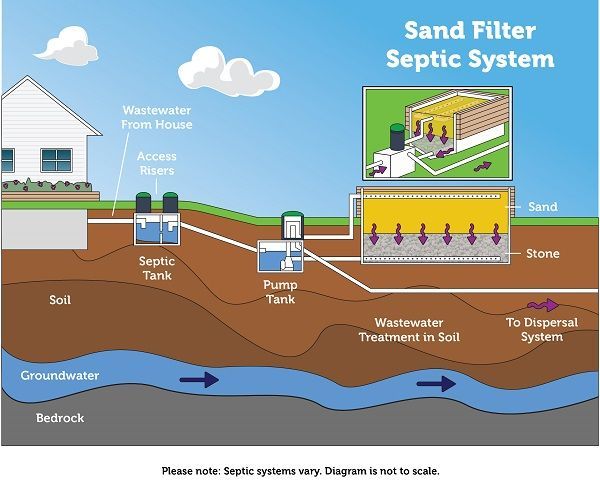
Sand filter systems are an effective way to treat wastewater in areas where the soil is not suitable for traditional septic systems. Sand filter systems are a type of alternative onsite sewage system that uses layers of sand and gravel to filter wastewater and remove contaminants before it is released into the environment. Here's what you need to know about sand filter systems:
How does a Sand Filter Systems Work?
A sand filter system consists of a septic tank, a pump chamber, and a sand filter bed. Wastewater from the home enters the septic tank, where it separates into three layers: scum, sludge, and effluent. The effluent layer is pumped into the pump chamber, which then pumps the effluent into the sand filter bed.
The sand filter bed is made up of layers of sand and gravel. As the wastewater passes through the layers, it is filtered by the sand, which removes contaminants such as bacteria, viruses, and other harmful substances. The filtered water then passes into the soil, where it is further treated and purified before being released into the environment.
Advantages of Sand Filter Systems:
Sand filter systems have several advantages over traditional septic systems. First, they are more effective at treating wastewater, which means that they can be used in areas where traditional septic systems are not suitable. Second, they are relatively easy to install and maintain. Finally, they are a more environmentally friendly option because they filter out contaminants before they can enter the soil and groundwater.
Disadvantages of Sand Filter Systems:
Despite their advantages, sand filter systems do have some disadvantages. First, they require regular maintenance to ensure that they are functioning properly. Second, they can be more expensive to install than traditional septic systems. Finally, sand filter systems are not suitable for all soil types, so it is important to consult with a professional to determine if a sand filter system is the right choice for your property.
Conclusion:
Sand filter systems are an effective alternative to traditional septic systems for treating wastewater in areas where the soil is not suitable for traditional septic systems. They are more effective at treating wastewater, relatively easy to install and maintain, and more environmentally friendly. However, they do require regular maintenance, can be more expensive to install, and are not suitable for all soil types. Consult with a professional to determine if a sand filter system is the right choice for your property.
